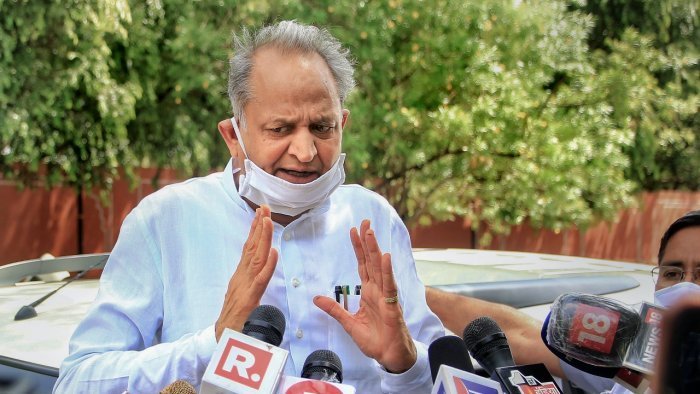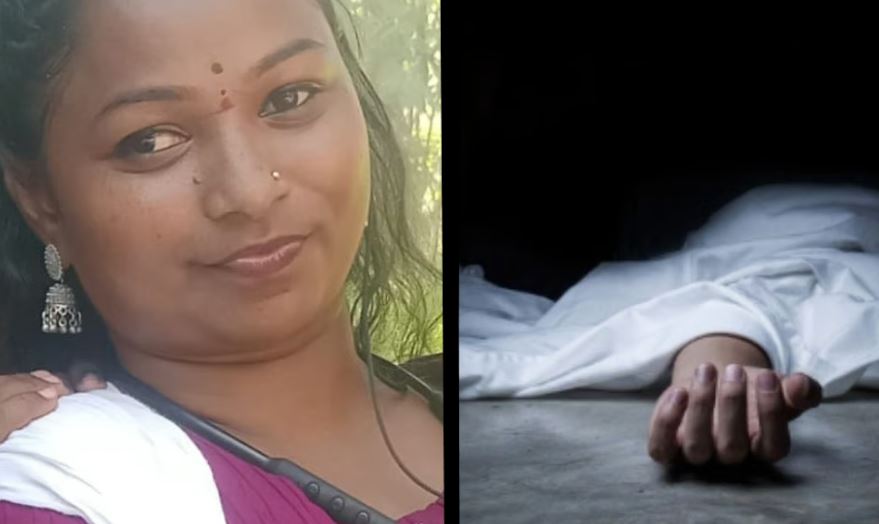India
Gehlot Budget includes a pension scheme free electricity and job guarantees

Rajasthan Chief Minister Ashok Gehlot presented a populist budget on Wednesday that included a pension system for state government employees, a job guarantee scheme for urban areas, free power for household users up to 50 units, and free treatment at government hospitals, among other ideas.
In the budget submitted to the Assembly by Gehlot, no new taxes were levied, and relief worth Rs 1,500 crore was provided to all sectors.
Gehlot also introduced the Indira Gandhi Urban Employment Guarantee Scheme, which will offer families in urban areas 100 days of work.
During his budget speech, he added, “Like usual, we have taken care of every part of society in the budget.”
Gehlot announced the restoration of the former pension scheme for personnel hired on or after January 1, 2004, in response to a large and long-standing demand among state employees.
He claimed that in 2004, a contributory pension was made available under the national pension scheme, but that this had produced a sense of insecurity among state employees over their post-retirement lives.
“We all know that public personnel can contribute significantly to excellent governance when they are confident in their future. From time to time, the staff has informed me of their suffering. As a result, beginning next year, I will implement the previous pension scheme for all employees hired on or after January 1, 2004,” he stated.
He also declared that employees of firms, boards, and colleges will get the 7th pay commission.
He promised 50 units of free electricity for those who use 100 units per month, a Rs 3/per unit award for all home consumers up to 150 units, and a Rs 2/unit grant for those who use 150 to 300 units and above, according to the slab.
Aside from increasing the Chiranjeevi Health Insurance cover from Rs 5 lakh to Rs 10 lakh, the chief minister also announced that the Chiranjeevi scheme will cover cochlear implants, bone marrow transplants, organ transplants, blood/platelets/plasma transfusions, and limb prosthesis (bone cancer).
The chief minister announced recruitment for 1 lakh posts, a separate cadre of English medium teachers for Mahatma Gandhi English Medium schools, 200 primary schools in desert districts, smartphones for 1.33 crore women with a 3-year internet connection, and the upgrade of all 3820 government secondary schools to senior secondary level in his nearly three-hour budget speech.
This time, the CM submitted a separate agriculture budget, allocating Rs 5,000 crore for the CM Krishak Saathi Yojna, up from Rs 2,000 crore in the previous budget, 11 Missions, and daytime power for irrigation in 17 districts where daytime energy was not available for irrigation.
Gehlot announced the Rajasthan Smart City Scheme for the integrated development of Jodhpur, Bikaner, Bharatpur, Alwar, Bhilwara, and Chittorgarh, in line with the central government’s Smart City Mission, which covers four cities in Rajasthan.
The CM declared that every assembly constituency would receive an increase in funding from Rs 5 crore to Rs 10 crore for road improvement. He also stated that the Jaipur Metro would be extended from Badi Chaupad to Transport Nagar, as well as from Mansarover to a 200-foot bypass on Ajmer Road.
Gehlot also announced plans to build 36 women’s colleges in 19 districts, a residential parasports academy in Jaipur and Jodhpur, and a Nehru Youth Transit Hostel and Facility Centre in Udaipur House in New Delhi with 250 rooms to accommodate 500 youths.
CM said that the SC and ST development budget will be increased from Rs 100 crore to Rs 500 crore and that a Rs 100 crore EWS (Economically Weaker Section) fund would be established.
He gave the tourism and hospitality sector industry status, extended the period of freedom for MSMEs from sanctions and inspection from three to five years, and exempted MSMEs from paying motor vehicle tax for four vehicles with automatic transmission costing up to Rs ten lakh.
On unoccupied or completed residential plots of up to 100 square yards, the CM offered a 1% stamp duty discount.
The revenue deficit in the budget year 2022-23 is anticipated to be Rs 23,488.56 crore, with a fiscal deficit of Rs 58,211.55 crore, or 4.36 percent of GDP.
Latest News
In Turbhe Division, Police Carry Out A Comprehensive Combing Operation

An Intensive Combing operation was conducted by police in Turbhe division.
The Operation
A thorough combing operation was carried out by the Navi Mumbai Police Commissionerate on Friday night across many police stations in the Turbhe Division as a pre-emptive precaution ahead of the Lok Sabha elections. The program focused on those engaged in a range of illegal actions, including as drug and alcohol abuse, gun ownership, smoking in public places, and moving offenses.
A total of 390 individuals were the focus of enforcement actions throughout the operation. These included enforcement actions taken in relation to 37 KOFTA (Keep Off the Footpath Act) cases, two illegal weapon seizures, 49 prohibition violations, 13 drug-related apprehensions, and two DUI cases. In addition, 255 people were punished for breaking the Motor Vehicle Act, 11 for breaking the Section 283 (hazardous driving), and 21 for breaking Section 285 (reckless driving).
Thirty police officers and one hundred and ninety-nine enforcers were deployed for the operation, which covered the police stations in Turbhe, CBD, NRI, Nerul, and Sanpada. At several points inside the jurisdiction, these individuals carried out targeted combing operations and strategically placed blockades.
Assistant Chief of Police Turbhe Division’s Rahul Gaikwad personally monitored the operation and gave the law enforcement forces vital direction. Senior authorities, such as Deputy Commissioner of Police Circle-1, Commissioner of Police Milind Bharambe, Joint Commissioner of Police Sanjay Yenpure, and Upper Commissioner of Police Deepak Sakore, provided direction and support for the effort.
Latest News
A Taxi Driver In Navi Mumbai Has Been Detained For Allegedly Murdering A Woman

The Navi Mumbai police have detained a 28-year-old cab driver from Nagpada, Mumbai, on suspicion of killing a 27-year-old lady who had been urging him to get married. On April 25, the decomposing corpse of the deceased was found in a dried-up stream at Talekar along Chirner-Kharpada in Uran, Navi Mumbai. It had been wrapped in a blanket.
A post-mortem was carried out, according to senior inspector Satish Nikam of the Uran police station, and a complaint was filed against unidentified persons under many provisions of the Indian Penal Code, including section 302 (murder). Police in Mumbai’s Mankhurd police station acquired information regarding a lady who had been reported missing on April 18 throughout the course of their inquiry. It was established that the missing woman’s body was the one discovered in Uran.
After more research, it was discovered that the cab driver and the woman were in love, and that she had been urging him to be married. When he refused, this had caused a rift between them. The official stated that the woman was picked up by the male on the evening of April 18 from Mankhurd and driven to Khadavli in Kalyan, Thane district. On April 19, he is said to have killed her at approximately one in the morning and disposed of her corpse in the rivulet. After being taken into prison on Saturday, the accused was brought before a local court, who placed him under police detention until April 29.
Latest News
Narcotic Group Arrested By Navi Mumbai Police

The Navi Mumbai Police successfully busted the Drugs selling group in the city.
Case in Detail
The Anti-Human Trafficking Cell of the Navi Mumbai police successfully raided Kopri village Sector-26A on Friday afternoon in a massive crackdown on drug selling, apprehending 11 African nationals. The people were reportedly assembled to engage in the illegal trade of drugs. During the operation, a significant amount of narcotics, including cocaine, methoxylon, and MDA pills, valued at an estimated Rs 1.83 crore, were seized.
The coordinated operation encompassed several units, including the Crime Branch Central Cell, APMC, and Vashi police stations. It was led by Assistant Commissioner of Police, Financial Crimes Branch, Dhanaji Kshirsagar, and Senior Police Inspector, Prithviraj Ghorpade. Following up on a tip from the Anti-Human Trafficking Cell, police moved quickly to raid the defendants’ purported residence, Kush Apartment.
When police arrived, the African nationals refused to be taken into custody, which led to a scuffle. But police officers were able to take them down and examine the area thoroughly, finding a large amount of illegal drugs. Along with methauculone and MDA, 1679 grams of cocaine were found among the confiscated goods, adding to the total estimated value of Rs 1.83 crore.
The Narcotic Drugs and Psychotropic Substances Act (NDPS) was used to book the following people: Donatous Chidokwe, Ofozor Basile, Edwin Obirah Udairke, Frak Nzekwesi, Vinson Llabadi Ukaigwe, James Cooper, Oku O Leaoun, George Blason, Charles Teme Ozorann Wapoka, A Guson Koukou Allen, and Ndwe Okechukwan Donatus.
-

 India2 years ago
India2 years agoAs the arrangement with Prashant Kishor falls through Rahul Gandhi has gone overseas again and is uncontactable
-

 Latest News3 years ago
Latest News3 years agoTata wins Air India with ₹18,000 crore bid
-

 Fact Check3 years ago
Fact Check3 years agoNidhi Razdan, fake Harvard professorship, and here is the explanation through her blog.
-

 Latest News3 years ago
Latest News3 years agoGovernment has spent ₹9,725 crores on Covid-19 vaccination drive so far
-

 Latest News2 years ago
Latest News2 years agoJharkhand government cuts Petrol price by massive ₹25 a litre but with a catch
-

 Technology2 years ago
Technology2 years agoBSNL reveals all new 4G plans starting at ₹16
-

 Navi Mumbai3 years ago
Navi Mumbai3 years agoNavi Mumbai civic body raids and tests morning walkers, many found COVID positive
-

 Entertainment2 years ago
Entertainment2 years agoReturn to Hogwarts Poster Reunites the Iconic Cast of Harry Potter
















